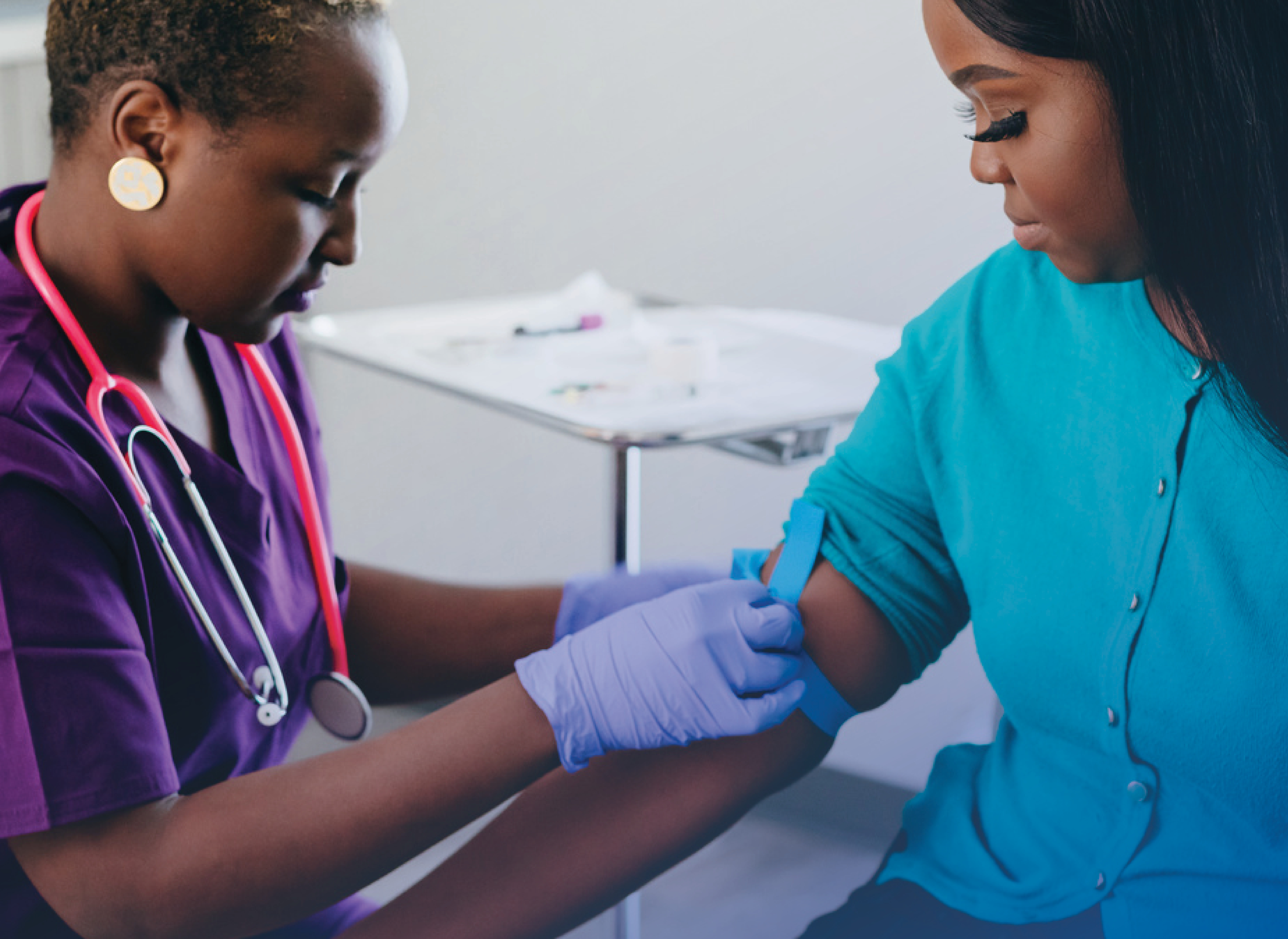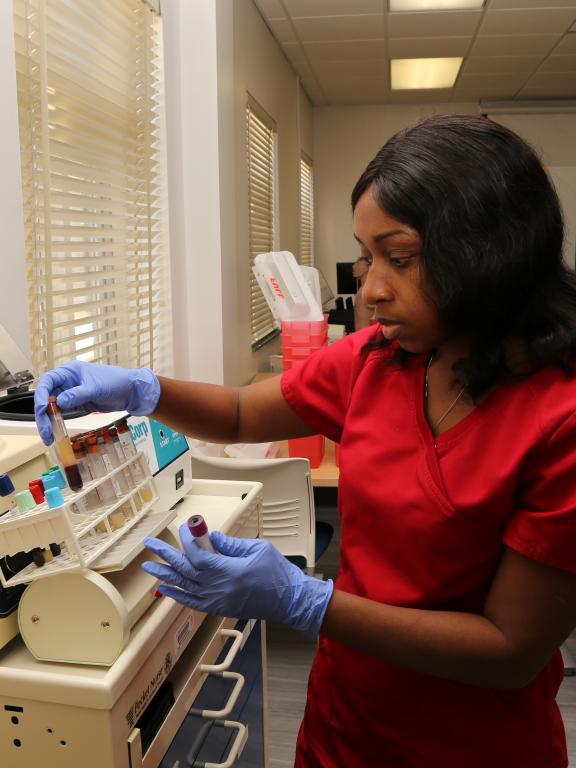The Path to Certification: Comprehending the Phlebotomy Training Program Trip and Its Relevance
As you think about the course to accreditation in phlebotomy, it's essential to understand the role you'll play in healthcare. Your training will certainly cover crucial abilities, from blood collection methods to patient communication.

The Function of Phlebotomists in Healthcare
Phlebotomists play a crucial function in the healthcare system, working as the vital link in between individuals and important analysis testing. You'll do blood draws, making certain samples are gathered accurately and securely. Your knowledge aids in identifying clinical conditions, checking health and wellness, and guiding therapy decisions.
In your everyday communications, you'll need to develop trust with individuals, making them really feel comfortable throughout what could be a stressful experience. You are accountable for classifying and dealing with examples carefully to stop contamination or mistakes, which could impact test outcomes.
Beyond this, you'll commonly function along with medical professionals and nurses, communicating crucial information about clients' conditions. By mastering your skills, you contribute meaningfully to patient care, making you an important component of the medical group.
Introduction of Phlebotomy Training Programs
When checking out phlebotomy training programs, you'll discover different kinds created to fit various routines and discovering styles. Each program assists you develop vital skills like blood collection and client interaction. Understanding these alternatives is vital to choosing the appropriate course for your job.
Types of Training Programs
Numerous sorts of training programs are readily available for those aiming to come to be competent in phlebotomy. You can select from certificate programs, which normally last a few months and focus on necessary skills. There are likewise diploma programs that offer a more complete education, often lasting approximately a year. If you're trying to find a deeper understanding, an associate level in an associated field may be the ideal fit. Online training courses provide flexibility for those stabilizing work or family members dedications, allowing you to research at your own rate. Furthermore, some medical facilities and clinics use on-the-job training programs, providing sensible experience while you learn. Whatever course you select, each program intends to furnish you with the necessary abilities for an effective phlebotomy occupation.

Key Abilities Created
Understanding phlebotomy needs a set of key skills that are developed through detailed training programs. In addition, communication skills are basic; you'll require to connect with patients, describe treatments, and put them at ease. Each of these skills is essential for your success as a licensed phlebotomist, making you a valuable asset in any medical care setting.
Secret Components of a Phlebotomy Course
In a phlebotomy training course, you'll concentrate on vital subjects that lay the foundation for your future career. You'll involve in hands-on training that permits you to use what you've learned in real-world setups. Both the core educational program and practical experience are vital for your success as a phlebotomist.
Core Curriculum Overview
While pursuing a phlebotomy training program, you'll encounter a core curriculum created to equip you with fundamental abilities and knowledge. Phlebotomy Training Course. This educational program usually consists of anatomy and physiology, focusing on the blood circulation system and recognizing blood components. You'll also discover various kinds of blood collection methods, including venipuncture and capillary leak strategies
Furthermore, infection control and safety procedures are necessary parts, guaranteeing you understand exactly how to preserve a sterilized atmosphere. You'll study patient interaction, emphasizing interaction and compassion, which are important for easing patient anxiety.
Hands-On Training Experience
Getting hands-on experience is an important part of your phlebotomy training course. This practical training permits you to use what you have actually discovered in a real-world setting, improving your skills and confidence. You'll practice venipuncture strategies, discover exactly how to handle various kinds of samplings, and get aware of the devices used in the field. Under the assistance of knowledgeable instructors, you'll fine-tune your abilities, guaranteeing you're planned for any kind of scenario you might encounter.
Furthermore, you'll obtain the chance to connect with clients, which is crucial for establishing your interaction skills. This mix of technological proficiency and social abilities is vital for your success as a certified phlebotomist. Eventually, hands-on training is where concept meets method, solidifying your understanding and preparedness for certification.
Accreditation and Licensing Needs
Before you can start your job in phlebotomy, it is vital to comprehend the qualification and licensing demands that differ by state. The majority of states require phlebotomists to hold an accreditation from an identified company, such as the National Phlebotomy Association or the American Society for Professional Pathology. These accreditations commonly involve passing an examination that checks your expertise and abilities in the field.
Along with accreditation, some states have details licensing requirements. You may need to finish a particular number of hours in scientific technique, submit proof of training, or go through a history check. It is necessary to investigate your state's guidelines to see to it you meet all required requirements.
Remaining notified regarding these needs not just aids you secure a setting however likewise improves your reputation as a specialist. By fulfilling these requirements, you'll be well on your way to a successful career in phlebotomy.
Hands-On Training and Practical Experience
Hands-on training and useful experience are necessary parts of your phlebotomy education and learning, Recommended Reading as they permit you to use academic understanding in real-world circumstances. During your training, you'll participate in supervised venipuncture, learn appropriate methods, and end up being acquainted with various blood collection equipment. This direct involvement is crucial for building your confidence and sharpening your abilities.
You'll function carefully with knowledgeable experts who can guide you via the subtleties of individual interaction and example handling. Each session not only reinforces your understanding but additionally prepares you for the busy atmosphere of health care settings.
Additionally, many programs incorporate clinical turnings, permitting you to experience varied settings, from health centers to outpatient centers. This exposure helps you adjust to various challenges and person requirements, ensuring you're well-prepared for your future function. Embrace these chances, as they're important to coming to be a qualified and compassionate phlebotomist.
Obstacles Dealt With Throughout Training
While getting hands-on experience is essential, it's essential to acknowledge the obstacles that can arise during your phlebotomy training. Furthermore, grasping the skills required for blood attracts takes technique; you may struggle with technique initially.
Time management can likewise be an obstacle, as harmonizing concept, practical sessions, and individual commitments can really feel intimidating. You may face varying learning paces amongst your peers, leading to feelings of insecurity if you my company assume you're falling back. Adapting to the different personalities of instructors can be tough, as each might have a special mentor style.
Recognizing these obstacles at an early stage can prepare you for success and assist you develop resilience throughout your training trip.
Occupation Opportunities After Accreditation

As you get experience, you might also consider focusing on areas like pediatric or geriatric phlebotomy, satisfying particular person needs. Some phlebotomists pick to advance their occupations by coming to be lab professionals or pursuing more education in health care areas.
Additionally, your accreditation can bring about roles in training or overseeing brand-new phlebotomists, allowing you to share your understanding. With the medical care industry constantly expanding, your abilities will always remain in need, paving the method for a secure and fulfilling profession. Accept the possibilities waiting for you!
Often Asked Inquiries
What Is the Common Duration of a Phlebotomy Educating Training Course?
Phlebotomy training programs generally last around four to 8 weeks. You'll take part in hands-on practice, classroom direction, and on the internet discovering. Finishing this training prepares you for certification and a rewarding profession in health care.
Are Online Phlebotomy Courses Available?
Yes, on the internet phlebotomy programs are offered. They supply adaptability and convenience, allowing you to examine at your i thought about this very own pace. Just confirm the program is recognized to fulfill qualification needs and gain important skills for your profession.
Exactly How Much Does Phlebotomy Training Normally Price?
Phlebotomy training normally sets you back in between $700 and $2,500, depending upon the program and area. You need to take into consideration factors like training course size, consisted of materials, and hands-on experience when choosing the right training for you.
What Prevail Requirements for Phlebotomy Training?
Typical prerequisites for phlebotomy training frequently include a senior high school diploma or GED, immunizations, and a background check. Some programs might likewise require standard health care knowledge or certifications, guaranteeing you're planned for hands-on training.
Can I Work While Completing My Phlebotomy Training?
Yes, you can function while completing your phlebotomy training. Several trainees equilibrium jobs with their researches, but make sure to manage your time successfully to guarantee you fulfill both work and training commitments efficiently.